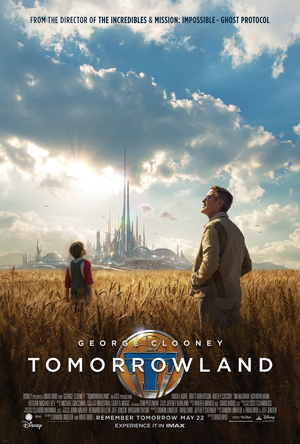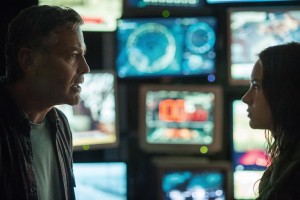 A while back, someone at Disney had the bright idea to develop a few of their theme park rides into motion pictures. And let’s face it, the first couple of attempts – Haunted Mansion, Country Bear Jamboree – were pretty awful. But then the studio struck gold with Pirates Of The Caribbean, which has become a rather lucrative franchise for them. Now someone apparently thinks that they can take that concept but expand it out to basing films on entire sections of their theme parks. Unfortunately, the first attempt, Tomorrowland, does not live up to its potential.
A while back, someone at Disney had the bright idea to develop a few of their theme park rides into motion pictures. And let’s face it, the first couple of attempts – Haunted Mansion, Country Bear Jamboree – were pretty awful. But then the studio struck gold with Pirates Of The Caribbean, which has become a rather lucrative franchise for them. Now someone apparently thinks that they can take that concept but expand it out to basing films on entire sections of their theme parks. Unfortunately, the first attempt, Tomorrowland, does not live up to its potential.
That Tomorrowland is such a disappointment comes as a surprise. Director Brad Bird has had a string of hits, first in animation with The Iron Giant, The Incredibles and Ratatouille and then in live action with Mission: Impossible – Ghost Protocol. But here, he has a huge creative misfire on his hands. He’s playing with classic science-fiction elements from Jules Verne-inspired steampunk rockets to the hopeful, shiny futurism of the early, pre-JFK assassination 1960s. And all of it just sits there on the screen, a fairly inert story that really doesn’t kick into any gear until the film is almost over. Ironically, one of the movie’s themes is about the transition from the hope and optimism that science used to bring to the world to now when it is often viewed with suspicion, questioned and demonized by those with their own agendas. But yet it doesn’t manage to engender any sense of wonder of its own.
The problem at the core of the film is the central mystery it presents the audience. Casey (Britt Robertson) is a precious, intelligent teen who discovers a mysterious pin that grants her a vision of a gleaming futuristic city filled with silver and glass spires, jetpacks, flying cars and rockets. Trying to trace the pin’s origins, she helped by the mysterious younger girl Athena (Raffey Cassidy, in perhaps the best performance of the film), finally coming to the home of Frank Walker (George Clooney). Frank explains that the pin is an invitation to Tomorrowland, a city in an alternate dimension that was founded over a century ago as a scientific utopia to develop new technologies for humanity. Unfortunately, something went wrong and Frank, who was invited to go to Tomorrowland as a child in the 1960s, says that it is impossible to go there now. An attack from a group of overly smiling humanoid robots convinces Frank to help Casey find a way to Tomorrowland.
A good portion of the movie is spent dodging these androids as Frank, Casey and Athena race one from location to another. It is not as if each stop holds another piece of the puzzle for their quest. It’s just that there is something at Point A that will transport them to Point B where something else will take them to Point C and so on. It is about as dramatically interesting as watching someone’s commute home from work that involves transferring from one subway line to another and maybe a bit of a bus ride as well.
 Almost all of the information Casey needs to answer her questions is held by Frank, but he just stubbornly doesn’t reveal anything. And the blame for this can probably be laid firmly at the feet of co-screenwriter Damon Lindelof. Characters talking past each other and never answering direct questions that would actually move the plot along is a criticism that had been leveled as the television series Lost on which Lindelof was a showrunner. I suppose that it is an acceptable thing to do when you have a full season or more worth of television to write, but when you only have approximately two hours of movie, it tends to keep things stalled for too much of the run time. If Frank had just taken a moment to say why he was exiled from Tomorrowland or if Athena would explain why she has been trying to recruit Casey, the film would have added some much needed tension and stakes that would have fueled their race to get to the city much more so than the vague mystery that is used here.
Almost all of the information Casey needs to answer her questions is held by Frank, but he just stubbornly doesn’t reveal anything. And the blame for this can probably be laid firmly at the feet of co-screenwriter Damon Lindelof. Characters talking past each other and never answering direct questions that would actually move the plot along is a criticism that had been leveled as the television series Lost on which Lindelof was a showrunner. I suppose that it is an acceptable thing to do when you have a full season or more worth of television to write, but when you only have approximately two hours of movie, it tends to keep things stalled for too much of the run time. If Frank had just taken a moment to say why he was exiled from Tomorrowland or if Athena would explain why she has been trying to recruit Casey, the film would have added some much needed tension and stakes that would have fueled their race to get to the city much more so than the vague mystery that is used here.
Directorially, Bird somehow never lets the audience connect with the spectacle on screen. The camera seems almost removed from the action, keeping us from really engaging with what we are seeing. Even something that should be as awe-inspiring as the initial long, swooping, single-take shot that tours us through Tomorrowland feels flat and bland, as if it was more about the camera move than the subject it was shooting. Another moment that should play like gangbusters, the opening of the Eiffel Tower to reveal it as a launch gantry for a steampunk rocketship that had been hidden under Paris, just sits there on the screen.
It is not that Bird doesn’t love the material he’s working with. There’s plenty of references to great science-fiction of the last century all through the film, everything from certain characters’ names to two oblique references to the movie The Rocketeer. There’s a sequence in a retro toy store that should be a lot of fun to freeze-frame all the way through to see how many different things are packed into it. Given that he has worked with such material before, in The Iron Giant and The Incredibles especially, Tomorrowland comes off as a let down.





Tom Stroud liked this on Facebook.